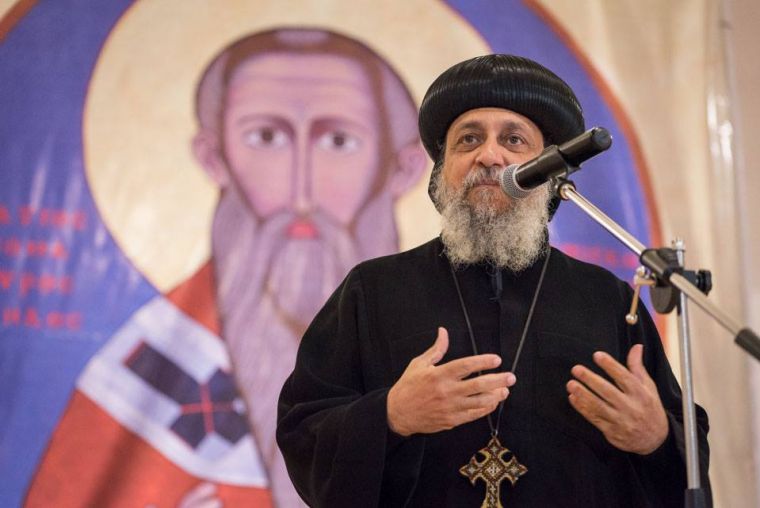What is the Coptic Orthodox Church? 6 things you should know

Egypt's Coptic Orthodox Church has made frequent appearance in the news of late. The Christian community has suffered several major terrorist attacks in Egypt since December, and Pope Francis is currently visiting the country in a show of unity and solidarity.
This ancient community stems from the earliest origins of the Christian Church and has played a decisive role in its life. Here are six things you should know about the Coptic Orthodox Church.
1. It starts with Mark
If the Catholic Church's founding saint is St Peter, then the Coptic Church's is St Mark.
The community, according to tradition, originated with the disciple and evangelist who visited Alexandria, Egypt in AD 42. Within half a century of the apostle's visit, Christianity had spread throughout the region.
The Coptic Pope, the head of the denomination, is also known as the Patriarch of Alexandria of the Holy See of Saint Mark. The seat of the Coptic Pope is St Mark's Coptic Orthodox Cathedral in Cairo, which also contains alleged relics of St Mark.
2. Back to Egypt
The Coptic Church makes its home in Egypt, though the denomination has spread far across the world with around 18 million adherents globally.
Egypt has great resonance in Christian theology – the Israelites made their Exodus from Egypt, while in the New Testament, the Holy Family fled the threat of King Herod and resided in Eqypt, fulfilling the prophecy that said, 'Out of Egypt I called my son' (Hosea 11:1).
A prophecy in Isaiah 19:19 describes Egypt as a land blessed by God, saying 'In that day there will be an altar to the Lord in the heart of Egypt, and a monument to the Lord at its border.' The Egyptian Coptic Church may be seen as a fulfilment of this prophecy.
3. Ancient schools
The denomination also formed the Catechetical School of Alexandria, the oldest theological school in the world, also founded by St Mark. Its teachers were some of the defining thinkers of early Christianity, such as Athenagoras, Clement, Didymus and Origen.
In 1893 the Orthodox Copts reestablished the school as the Coptic Theological Seminary, a contemporary training hub for Coptic prelates, whose graduates include the previous Coptic Pope, Shenouda III.
4. Desert fathers
Another legacy of the Coptic Church is the monastic movement of Egypt's Desert Fathers. These 3rd-century Christian sojourners sought the ascetic life in Egypt's deserts. They advocated the selling of possessions, giving to the poor, withdrawal from society and the seeking of contemplative solitude in the wilderness.
The most famous of the fathers is Anthony the Great. This hermit community was a significant influence on Eastern Christian spirituality and the Western Church, inspiring movements like the Benedictines.
5. Credal crisis
The Coptic Church played a defining role in shaping the Church's foundational creeds. The heretic Arius, who denied that Jesus and the Father were both equally pre-existent, and Athanasius, who opposed him, were both from Alexandria. That controversy was settled at the Council of Nicea in AD 325.
Pope Timothy I of Alexandria presided over the Council of Constantinople, which affirmed the divinity of the Holy Spirit, and Pope Cyril I of Alexandria led the Council of Ephesus, confirming that Mary, Jesus' Mother was Theotokos ('the Mother of God'). The heretic Nestorius had taught that Jesus could be divided into two persons, the man Jesus and God the Word, who was not joined with Christ, but only dwelt in him.
The Oriental Orthodox Church (which includes the Coptic Church among others) divided from the rest of the Church however at the AD 541 Council of Chalcedon, in a complex debate about how to define Christ's human and divine nature.
6. Intense persecution
Another legacy of the Coptic community is the intense persecution it has faced over its long history. While it once dominated Egypt, following the Muslim invasion of Egypt in AD 639, Coptic Christians eventually became a minority (around 10 per cent of the population) in a majority-Muslim country.
The Coptic community has been subject to intense attacks in recent years, particularly from Islamist fundamentalist groups.
In 2015 21 young Coptic Christians were beheaded by ISIS in Libya, with footage of the killings released online. In December, the jihadists claimed responsibility for a Cairo Coptic church bombing that killed 27.
This year ISIS vocally incited violence against the community, forcing hundreds to flee their homes in northern Egypt in February. Palm Sunday bombings on two Egyptian churches, including the seat of the Coptic Pope, killed at least 45 and injured over 100.
Despite this, the community has remained bold and resilient, choosing forgiveness instead of hatred, and hope instead of fear. As one Coptic bishop recently remarked: 'When you are not afraid, you are able to love, to forgive and to show strength.
'Carrying the suffering doesn't mean carrying hatred. And expressing pain and suffering doesn't mean that I'm afraid.'











